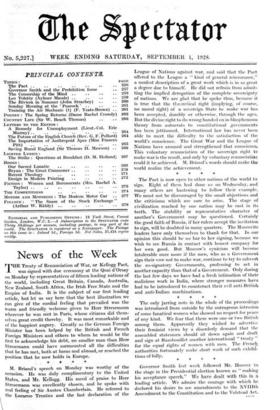M. Briand's speech on Monday was worthy of the occasion.
He was duly complimentary to the United States, and Mr. Kellogg. His rneed of praise to Herr Stresemann was excellently chosen, and he spoke with real feeling of Sir Austen Chamberlain. He referred to the Locarno Treaties and the last declaration of the League of Nations against war, and said that the Pact offered to the League a " kind of general reinsurance," a modest description of a great work which is in so great a degree due to himself. He did not refrain from admit- ting the implied derogation of the complete sovereignty of nations. We are glad that he spoke thus, because it is true that the theoretical right (implying, of course, no moral right) of a sovereign State to make war has been accepted, dumbly or otherwise, through the ages. But the divine right to do wrong handed on in blasphemous theory froM autocrats to constitutional governments has been jettisoned. International law has never been able to meet the difficulty to the satisfaction of the world's conscience. The Great War and the League of Nations have aroused and strengthened that conscience. This voluntary renunciation of the sovereign right to make war is the result, and only by voluntary renunciation could it be achieved. M. Briand's words should make the world realize the achievement.
* * * *






























